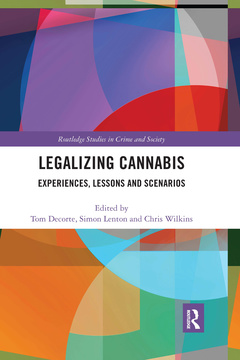Description
Legalizing Cannabis
Experiences, Lessons and Scenarios
Routledge Studies in Crime and Society Series
Language: English
Keywords
THC Content; Medical Cannabis Users; Commercial Cannabis; Cannabis Industry; Cannabis Legalization; Cannabis Policy; Cannabis Markets; Cannabis Law Reform; CSCs; Cannabis Cultivation; Medical Cannabis; Cannabis Users; Cannabis Products; Dutch Drug Policy; THC; Recreational Cannabis; Medicinal Cannabis; Cannabis Possession; Cannabis Control; Medicinal Marijuana; Legal Marijuana; Recreational Marijuana; Legal Highs; Cannabis Growers; Smoke Free Policies
Publication date: 09-2021
· 15.6x23.4 cm · Paperback
Publication date: 02-2020
· 15.6x23.4 cm · Hardback
Description
/li>Contents
/li>Readership
/li>Biography
/li>
Marijuana is the most widely used illegal drug in the world. Over the past couple of decades, several Western jurisdictions have seen reforms in, or changes to, the way cannabis use is being controlled, departing from traditional approaches of criminal prohibition that have dominated cannabis use control regimes for most of the twentieth century. While reform is stalled at the international level, the last decade has seen an acceleration of legislative and regulatory reforms at the local and national levels, with countries no longer willing to bear the human and financial costs of prohibitive policies. Furthermore, legalization models have been implemented in US states, Canada and Uruguay, and are being debated in a number of other countries. These models are providing the world with unique pilot programs from which to study and learn.
This book assembles an international who?s who of cannabis scholars who bring together the best available evidence and expertise to address questions such as: How should we evaluate the models of cannabis legalization as they have been implemented in several jurisdictions in the past few years? Which scenarios for future cannabis legalization have been developed elsewhere, and how similar/different are they from the models already implemented? What lessons from the successes and failures experienced with the regulation of other psychoactive substances (such as alcohol, tobacco, pharmaceuticals and ?legal highs?) can be translated to the effective regulation of cannabis markets?
Legalizing Cannabis will appeal to anyone interested in public health policies and drug policy reform and offers relevant insights for stakeholders in any other country where academic, societal or political evaluations of current cannabis policies (and even broader: current drug policies) are a subject of debate.
Introduction; PART I : THE NEW LEGAL CANNABIS MARKETS; 1.The uneven repeal of cannabis prohibition in the United States; 2.Practical lessons learned from the first years of the regulated recreational cannabis market in Colorado; 3.Recreational marijuana legalization in Washington State: benefits and harms; 4.A century of cannabis control in Canada: a brief overview of history, context and policy frameworks from prohibition to legalization; 5.Uruguay: the first country to legalize cannabis; PART II: GENERAL MODELS OF REFORM; 6.Cannabis decriminalization policies across the globe; 7."More than just counting the plants": different home cannabis cultivation policies, cannabis supply contexts and approaches to their evaluation; 8. City-level policies of regulating recreational cannabis in Europe: from pilot projects to "local customization"?; PART III: LESSONS FROM ALCOHOL, TOBACCO AND LEGAL HIGHS 9.Lessons learned from the alcohol regulation perspective; 10.Lessons from tobacco regulation for cannabis product regulation; 11.How not to legalize cannabis: lessons from New Zealand’s experiment with regulating "legal highs"; PART IV: EARLIER INNOVATIONS IN CANNABIS LAW REFORM; 12.Coffeeshops in the Netherlands: regulating the front door and the back door; 13. Cannabis social clubs in Spain: recent legal developments; 14.Swiss cannabis policies; 15. The Australian experience and opportunities for cannabis law reform; 16.Cannabis policy reform: Jamaica’s experience; PART V : NEW CANNABIS LEGALIZATION PROPOSALS; 17.The risks of cannabis industry funding of community and drug treatment services: Insights from gambling; 18.Insights for the design of Cannabis Social Club regulation; Conclusion
Tom Decorte is Professor of Criminology and Director of the Institute for Social Drug Research (ISD) at Ghent University (Belgium). He is co-founder of the Global Cannabis Cultivation Research Consortium (GCCRC). His research interests include patterns of substance use, on the supply side of cannabis markets, and on the implementation of local drug monitoring systems. He has been advisor to a range of organizations on policies to improve public health relating to the use of drugs around the world.
Simon Lenton is a Professor and Director of the National Drug Research Institute at Curtin University, Australia, and works part time as a clinical psychologist. He has published widely on drugs, health and the law and provided advice to a range of government and private organizations on evidence-based drug policy and other drug issues.
Chris Wilkins is Associate Professor and is the leader of the drug research team at SHORE & Whāriki Research Centre, Massey University, New Zealand. He has researched drug trends, drug markets and drug policy change. Dr Wilkins has been an invited speaker at international meetings in Europe, the United States and Australia.




